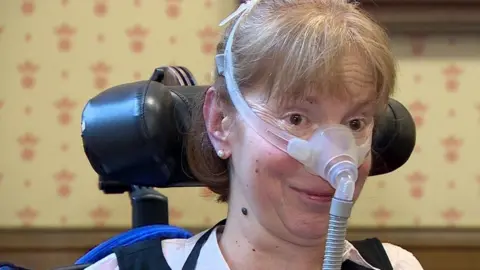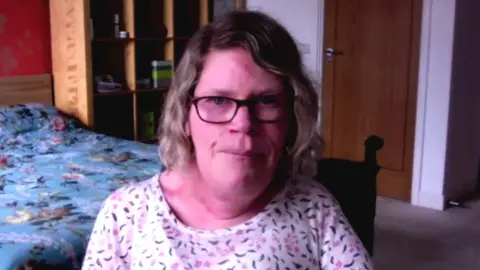Disabled people fear shortage of personal assistants and the loss of independence
 BBC
BBCA disabled member of the House of Lords says she "fears" disabled people could end up living in care homes if a "severe" shortage in personal assistants is not addressed.
Baroness Jane Campbell, a cross-party peer, and others have been struggling to recruit PAs in recent years.
Personal assistants, known as PAs, help with care and general tasks to enable individuals to live independently.
The government said £500m will be used to "develop the existing workforce".
Veteran disability campaigner Baroness Campbell contacted the BBC's Access All podcast to say: "The situation is so bad I fear disabled people will be forced back into living in instructional settings.
"Most of us escaped from them in the 1970s to live independent lives. We don't want to go back."
The Baroness is a wheelchair user with the muscle wasting condition spinal muscular atrophy (SMA).
According to the Local Government Association (LGA) about 70,000 people in England use PAs. It described the current lack of workers as "severe" in a recent report.

Listen to Access All on BBC Sounds
In the latest Access All podcast, Nikki Fox discusses Baroness Campbell's fear with Anna and Katy who are experiencing their own PA challenges.
And disabled comedian Rosie Jones chats about the frustration at being turned away from gay nightclubs by bouncers who think she's too disabled to be gay or that her wobbliness means she's drunk.


PAs are recruited after someone is given a care needs assessment by the local authority. If someone doesn't pay for the care privately, the authority considers and allocates the number of hours they need support for and assigns a budget to pay for it.
This is either managed by the local authority as home help or the individual can opt for direct payments where money goes into a bank account and the disabled person arranges their own assistance.
The latter gives the individual more control over who cares for them and the jobs they do, but it also turns them into an employer with all the legal and practical issues that involves, including recruitment.
Anna, who uses a wheelchair due to an energy impairment, has been awarded a budget for 35 hours a week of PA support, but after her last PA left in June, she's found no-one to replace her.
"You're putting up adverts and it's just tumbleweed," she says.
She describes her PAs as "my hands".
"They help if I cook a meal or I make my Christmas cake. They'll open the door that I can't open because it's too heavy."
There are other, incidental, tasks they help with too. Like the weeks of frustration she felt when her bedroom clock stopped and she couldn't reach the battery.
But it has knock on effects for personal care and wellbeing too with Anna saying she can only shower once a week currently without support from a PA because she doesn't have the energy to do more for herself.
Without that support, Anna says it feels like she's living a "temporary life" having to stop lots of activities she enjoys because she can't manage them alone.
She continues to try and recruit assistants but feels she's been let down one too many times, and recently turned to Twitter to vent her frustration.
"Had a new PA start and she was terrible and then quit with no notice after a week and a half," she tweeted.
Anna believes something has happened to the market and availability of people who want or value this kind of job.
Many people point to one particular moment in recent history which they feel changed the landscape of PA work and availability - Brexit.
PAs are not currently recognised as "skilled workers" and, after Brexit, are no longer eligible to work in the UK.
Baroness Campbell said: "We need workers from Europe to be able to return to this country to make up the shortage of personal assistants."

In 2021, the government's Migration Advisory Committee recommended care workers were added to the occupation shortage list. But as individuals are unable to sponsor workers for a visa, only organisations can, this isn't a quick fix either.
Katy Etherington also has SMA and uses a wheelchair. She works as a graphic designer and was motivated to set-up PA Pool in 2007 because PA recruitment was the "bane of my life".
Like a dating site, PA Pool matches PAs with clients who have compatible personalities. It currently has about 22,000 members nationwide, but the number of people needing a PA now far outweighs available assistants.
She said that prior to Brexit, a third of her PAs came from Europe who would often commute over every few weeks to do a block of work with her.
The job requires a particular kind of person. It can feel as though you're living someone else's life and so the career span can be quite short. Europeans would often choose to do it to learn English whilst also getting paid.
Katy says: "British people aren't quite so suited to this kind of work because they have their own life here. It's very difficult to distance yourself from your life when it's literally just down the road."
The LGA found low pay or a lack of sick and holiday pay were some of the main reasons people leave the job. Regular turnover means recruitment can be an ongoing process - but there is little interest in becoming a PA.
Katy says: "We've seen PAs say that they've left to go and work in a coffee house or as a dog walker because they earn more."
In July, the LGA recommended the budgets should take local market conditions into consideration rather than only offering the minimum wage of £9.50 an hour to a PA, to alleviate this kind of problem.
The Department of Health and Social Care said it has plans to "bolster recruitment and retention" of personal assistants.
"We have also delivered a national recruitment campaign highlighting different adult social care roles, with planning for the next campaign underway," it said.
But Katy thinks there are more simple ways to improve the situation. She says the job comes with great opportunities that need to be shouted about.
"It's not just about helping someone get up in the morning. It could be going on a four month cruise around the world, which is what I did with my PA.
"We need to inspire people to become PAs. You get to do things that you never would normally do."
Anna believes disabled people need to become better at selling the idea of what a PA is so people understand, rather than assume, what the role involves.
"If there were genuine voices of disabled people at every level [of policy making], then I think we would be in a better position to try and find solutions together."
Anna has had some good news herself in recent days. Someone has come forward and might be available to support her for two mornings a week.
She's trying not to raise her hopes, but even this will make a huge difference to her life.
You can listen to the podcast and find information and support on the Access All page.

